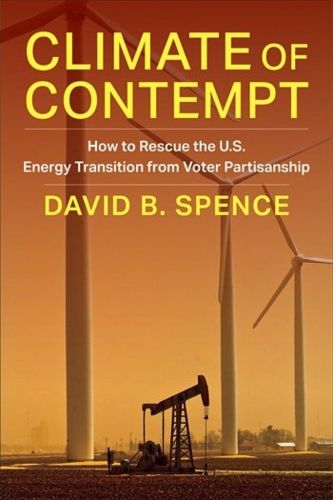Readings Newsletter
Become a Readings Member to make your shopping experience even easier.
Sign in or sign up for free!
You’re not far away from qualifying for FREE standard shipping within Australia
You’ve qualified for FREE standard shipping within Australia
The cart is loading…






Why is the United States struggling to enact policies to reduce carbon emissions? Conventional wisdom holds that the wealthy and powerful are to blame, as the oligarchs and corporations that wield disproportionate sway over politicians prioritize their short-term financial interests over the climate's long-term health. David B. Spence argues that this top-down narrative misses a more important culprit-with critical consequences for the energy transition.
Climate of Contempt offers a voter-centric, bottom-up explanation of national climate and energy politics, one that pinpoints bitter partisanship as the key impediment to transitioning to a net zero carbon future. Members of Congress respond to voters whose animosity toward the opposing party makes compromise politically risky. The most powerful driver of polarization, in turn, is the mixture of ideology and social media that constitutes today's information environment, which amplifies anger, spreads half truths and falsehoods, and sows division, distorting voters' understandings of the energy transition and their fellow citizens.
Spence explores the effects of polarization, partisanship, and propaganda on energy policy and considers how to build a broader climate coalition. He contends that cooperation on this crucial issue is still possible, but it will require sustained person-to-person engagement across ideological and partisan boundaries to foster a more productive dialogue. Providing a timely and incisive understanding of the politics of the energy transition, Climate of Contempt suggests new paths forward and offers hope for a net-zero future.
$9.00 standard shipping within Australia
FREE standard shipping within Australia for orders over $100.00
Express & International shipping calculated at checkout
Why is the United States struggling to enact policies to reduce carbon emissions? Conventional wisdom holds that the wealthy and powerful are to blame, as the oligarchs and corporations that wield disproportionate sway over politicians prioritize their short-term financial interests over the climate's long-term health. David B. Spence argues that this top-down narrative misses a more important culprit-with critical consequences for the energy transition.
Climate of Contempt offers a voter-centric, bottom-up explanation of national climate and energy politics, one that pinpoints bitter partisanship as the key impediment to transitioning to a net zero carbon future. Members of Congress respond to voters whose animosity toward the opposing party makes compromise politically risky. The most powerful driver of polarization, in turn, is the mixture of ideology and social media that constitutes today's information environment, which amplifies anger, spreads half truths and falsehoods, and sows division, distorting voters' understandings of the energy transition and their fellow citizens.
Spence explores the effects of polarization, partisanship, and propaganda on energy policy and considers how to build a broader climate coalition. He contends that cooperation on this crucial issue is still possible, but it will require sustained person-to-person engagement across ideological and partisan boundaries to foster a more productive dialogue. Providing a timely and incisive understanding of the politics of the energy transition, Climate of Contempt suggests new paths forward and offers hope for a net-zero future.